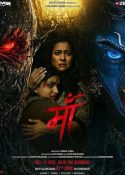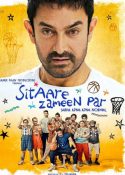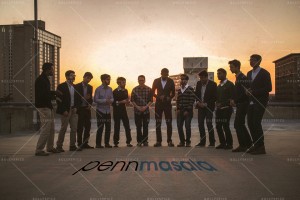 What do you get when you bring together a group of fabulous singers who do it a cappella style and mix it with Bollywood? You get Penn Masala of course! The University of Pennsylvania’s South Asian a cappella group has had a huge fan following for their unique take on a cappella music with covers of Bollywood songs, plus their wicked mash-up mixes of South Asian and Western tracks. Recently their fan base went through the roof with their ode to Bollywood, Evolution of Bollywood. Starting from the 1940s era of Hindi film songs, the boys sang their way through the iconic and classic tracks of each decade till today. It went absolutely viral when they released the killer video and it now has over 1 million hits on YouTube. After hearing and seeing the song and then going through their catalog of music I had to find out more! Check out all the cool things I found out when one of the singers of the group, Varshil Patel, talked to me about all things Penn Masala!
What do you get when you bring together a group of fabulous singers who do it a cappella style and mix it with Bollywood? You get Penn Masala of course! The University of Pennsylvania’s South Asian a cappella group has had a huge fan following for their unique take on a cappella music with covers of Bollywood songs, plus their wicked mash-up mixes of South Asian and Western tracks. Recently their fan base went through the roof with their ode to Bollywood, Evolution of Bollywood. Starting from the 1940s era of Hindi film songs, the boys sang their way through the iconic and classic tracks of each decade till today. It went absolutely viral when they released the killer video and it now has over 1 million hits on YouTube. After hearing and seeing the song and then going through their catalog of music I had to find out more! Check out all the cool things I found out when one of the singers of the group, Varshil Patel, talked to me about all things Penn Masala!
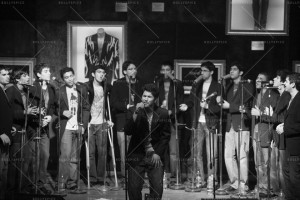 So give us a quick background on Penn Masala and why and how it started.
So give us a quick background on Penn Masala and why and how it started.
It started in 1996 and we have continued to be a group of 10-14 students. Back in ’96 there were a lot of a cappella groups; a cappella has been a great musical tradition at universities for a while. Our founders are all South Asian. The story sort of goes that 4 of them, they were all freshmen, sat in a dorm room and were like ‘Hey, there are all these a cappella groups. We are pretty good at music. We really, really, really like South Asian music and Western music – if there is anyway we can take both of these and blend them…’ So they came up with the concept of doing South Asian a cappella: taking songs from Bollywood adding a cappella styles and then matching them up with Western songs. They attempted that for the first time in ’96 and ’97. It didn’t go super well, but people thought the idea was very novel. As a result this group started to grow in numbers. They were able to eventually figure it all out with advice from other people on campus: how to produce arrangements and how to do a cappella music well. From there the group has done really well particularly in the early 2000s. We were featured in a movie called American Desi that released in the early 2000s. It was a pretty popular movie and the soundtrack was Penn Masala’s music. From there we have been growing ever since.
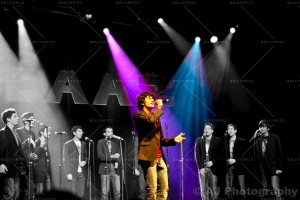 How does a singer at Penn become part of the group?
How does a singer at Penn become part of the group?
We are pretty much like any other a cappella group on campus in terms of recruitment. We have open auditions once the school starts in the fall and sometimes we will have additional auditions in the spring. It is open to any Penn student who is a male. You don’t have to be of South Asian background, in fact, not all of our members are of a South Asian background. It is literally, as long as you have an interest in the group and can sing we welcome you to come try out at the open auditions. There is a first round where you come in you do song you do some scales for us so we can gauge your musicality. Then we have additional rounds of interviews/auditions where we get to know the person a lot better. It is kind of like 50% personality and 50% musicality. For us since the group is so small and we do a lot together it is almost as important for us to connect with you and feel like you will be a part of the group as it is for you to have a great voice and musicality.
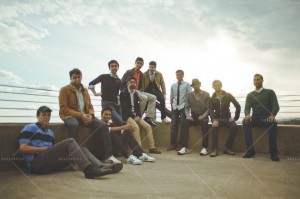 Now this is a cappella music, which is totally cool, what challenges do you think that brings besides of course the lack of instruments but that you make music with only your mouths? (Yes, that is reference to Pitch Perfect)
Now this is a cappella music, which is totally cool, what challenges do you think that brings besides of course the lack of instruments but that you make music with only your mouths? (Yes, that is reference to Pitch Perfect)
(Laughs) One of the biggest challenges is that most singers come into college with very little a cappella experience, so they are used to singing songs, not syllables. So when you are singing syllables and trying to mimic instruments, obviously, the first challenge is actually to be able to do that and being able to hold your parts. The other challenge is that the background parts have to blend together. That is also very difficult to master in the beginning, because if you sort of just blare your part without really thinking about how it sounds with everyone else’s part, it does not work. That is a big challenge.
The other big challenge with a cappella music is actually arranging a cappella music. Since we do so many covers, taking a song and then being able to convert it into a cappella format so that it still sounds good, or has that unique take on it is very difficult. It is a pretty time consuming process.
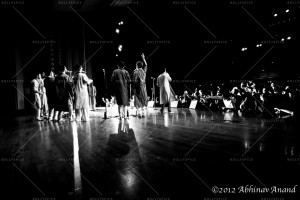 Of course, you have some of great a cappella renditions of Bollywood tracks. How do you take something like ‘Dheere Jalna’ and transpose that into an a cappella version?
Of course, you have some of great a cappella renditions of Bollywood tracks. How do you take something like ‘Dheere Jalna’ and transpose that into an a cappella version?
We have a music committee within the group and those are the people that have the most background in music theory and have formal music training. Honestly, it is an intensive process. We take a song and we develop a skeleton for the chords that go into it, then we add notes and the syllables and the special parts to enhance the song. We literally layer the notes, the words, and the music over time. That is the approach.
One of the things that is difficult is finding two songs that pair well together and then finding an arrangement that meshes them well together. That again is just a lot of experimentation. We just keep trying, arranging things differently until something just clicks and it sounds great.
Yes, that must be very difficult to find which part of the Western track you are going to use, compared to the right Hindi phrase or musical part you are going to use from the Bollywood track, and then have it sound like one song.
It really is! It is nice because we have people from a lot of different backgrounds and people have different musical tastes, people have different musical abilities and that really helps. I think as students we are also very willing to take risks in the sense that we are willing to experiment a lot and try things out. I think that sort of keeps us moving forward.
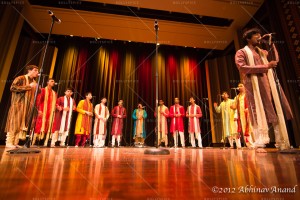 So are all of the guys in the group music majors?
So are all of the guys in the group music majors?
In fact none of us study music for our major! The group is pretty diverse in terms of what they study but we have a lot of engineers, we have a lot of pre-med students, we have three to four business students. We are sort of all over the map. None of us actually formally study music.
Okay now we have to get to the Evolution of Bollywood. First why did you decide to do this song?
I am sure you have heard of Pentatonix. They did an evolution of music that was for Western music. I remember a bunch of us we were watching the video and we thought that is a great concept. We do brain storming meetings every now and then for new ideas, projects, songs we want to do and someone brought up, ‘Hey this is very neat. Do you think we could do that for Bollywood?’ So then we sort of went on a hunt to find out has anyone ever tried to put together a medley of the iconic songs of the different decades of Bollywood and quickly realized nope, no one has really done this. There were short melodies but nothing really done to actually actively try to span the entire existence of Bollywood. So, we are like, you know what lets give it a shot.
This was a really difficult and time-consuming process because there are so many songs. Every song has a different arrangement to it and being able to blend them all together into a medley, it was difficult. But this is something we knew we would love working on because we all love Bollywood music. It is also just something people would love to listen too because it is so relatable. If you are younger you have heard the old tunes at home maybe, if you are older you have grown up with these tunes and seen Bollywood evolve, so we thought it would be something that people could really relate too. We got really excited about it. Spent a lot of months preparing it and then finally released it.
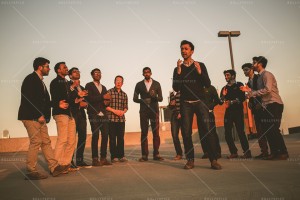 Tell us how you went about deciding which songs you would include in this number?
Tell us how you went about deciding which songs you would include in this number?
That was really tough! We considered close to 1,000 songs, I think. We made a Google doc with every decade and we thought of every iconic song of that decade. We would individually brainstorm like, ‘Hey, if you were to make your own evolution of Bollywood music what songs would you put on it?’ Then we compiled that list. We asked our parents, ‘What did you listen to?’ We looked online, we looked at what people were most listening to then for each decade. We got together as much data as we could get. So then we had a master list of songs from each decade. Then slowly we started.
There were two things we used to figure out how we got to the final 50-ish songs. One, we tried to find that songs that were most iconic and the ones that were the most recognizable so people would know this is song is from that decade. Then second we had to figure out what kind of progression can we make with these songs: which of these songs sort of work well together. Which of these songs can we actually put together because some songs are sort of hard to place into the arrangement. Again this was very, very difficult. We started with the 1940s and we knew we wanted these, and these work well together…then it went to what is a good song to transition from the 40s to the 50s and so on.
How long did it take you from that first brainstorm to final song and video?
I think we thought of the idea about 8 months ago and then it took us like 4 to 5 months of work to put it together. The deciding on the songs took a couple of months, then arranging it, teaching it, rehearsing it, recording it and then putting the music video together at the end so all in all about 4-5 months of work.
 There are many different styles, syncopation’s and beats in the originals that you had to mesh and marry together from each of the decades. Was one decade more difficult?
There are many different styles, syncopation’s and beats in the originals that you had to mesh and marry together from each of the decades. Was one decade more difficult?
That is a very good question. I don’t think any particular one was most difficult. We definitely tried with the 2000s and the 2010 and on to step it up, in the sense that we made everything faster. We did more and more songs. I think that might have been one of the more difficult things to do find songs where the tempo is constantly increasing.
Do you have favorite song or section in the track?
I really like the ‘Jiya Re’ portion. I think that is just a great transition.
I am also fan and especially in the video, because we think it looks kind of funny when start doing ‘Tunak Tunak’ all together and two of the guys put on the turban.
So getting to the video, what went into the concept?
Again we took some inspiration from Pentatonix because they did a pretty simple video. They would just change the color grading like they would go from black and white and then the colors would change as the songs evolved. So we thought that was a neat concept and definitely wanted to include that. Initially we were playing around with ideas of making a story line out of it or something more complicated. But then we thought since it is the evolution of Bollywood music, let’s focus on the evolution both visually and musically. We tried to make it stationary because we all have to be in the same place for it to work, so we thought lets focus on costume changes. There are so many unique costumes for each decade this will be perfect. Let’s make one of the key things costume changes and then add in the color-grading thing so that each decade will go from black and white to sepia and eventually to full color and in HD. That worked really well, I think. The costume thing took awhile because we didn’t have the costumes available and we didn’t really know what people looked like back then. It took watching clips on YouTube and stuff to figure out what we should be wearing.
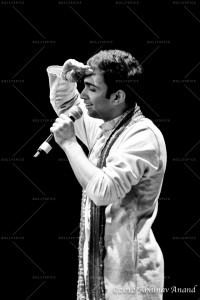 Did you anticipate the video to be such a phenomenal hit?
Did you anticipate the video to be such a phenomenal hit?
You know, I think we thought it would do well especially among our fan base, but then we were just surprised about the amount of people who didn’t know about Penn Masala who saw the song. I would hear from distant family members that I did not send the video to and they were like, “Oh I saw the video.” All my friends here were like our families are passing the video around on email chains. It was getting viral very quickly. Once we released the video, we did put some work in sending it out to media outlets and we would tweet it at famous stars and stuff. But we were just sort of like ‘hey some people will watch it, some people won’t’. We knew our fans would like it, but it was just really gratifying the number of people that hadn’t heard about us that just loved it. That even though we haven’t heard of the is group they still gave the video a chance. We got tons of positive feedback. It was a bit surprising. We expected some sort of positive response but not nearly the viral-ity that we saw and still are seeing.
How does it feel knowing that stars such as Hrithik Roshan, Shreya Ghoshal, Ehsaan and many others from the Bollywood film industry have praised the video?
It really is amazing. It is almost a dream come true. I remember when Hrithik tweeted we were all like Holy… I mean I grew up watching Hrithik. Then Shreya Ghosal is probably, collectively, our favorite female singer. She sent us an individual message saying she really loved it. She sent us her email address to get in contact with her. We were all so taken aback and everyone was fighting over who would get to email her. (Laughs) It was so great. It was so incredible to see people and stars you idolize tweeting you back and actually interacting with you. It was just super gratifying.
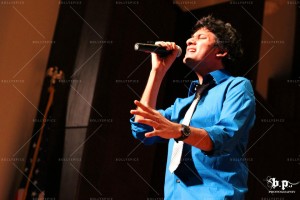 Though you had a huge following, this has brought much more exposure, not only you guys, but acappella and Hindi music as well.
Though you had a huge following, this has brought much more exposure, not only you guys, but acappella and Hindi music as well.
For sure! You know as a college group we have academics and everything. And of course, what we are always trying to do is making Penn Masala a bigger name and have our music out there. But you know, the power of a cappella music here in the United States is pretty big. You don’t need anything, you just need your voices and some creatively and music talent. One of the things I think as a group we would love to accomplish is to spread South Asian a cappella even farther and especially in India. I think in India a cappella is slowly taking root, but not that quickly. I think the potential for a cappella groups to help support the music industry in incredible. I could see it spreading like wild fire through universities and even Bollywood. What is most exciting is if we can push the frontiers of South Asian a cappella especially in India. That would be really exciting. That is part of the over arching goal of the next few years. We can take this, use it as a platform to get more content out to the people who now listen to us! Then find ways to spread a cappella I think it would be great to pioneer that.
 Bollywood music in the US: if you are a Bollywood fan you know the music but for the non-Bollyfied it is not as well known, except of course for Rahman’s ‘Jai Ho’. Do you think that will change?
Bollywood music in the US: if you are a Bollywood fan you know the music but for the non-Bollyfied it is not as well known, except of course for Rahman’s ‘Jai Ho’. Do you think that will change?
I do think it will change for two reasons. One I think Bollywood is becoming very integrated with Hollywood and there are a lot interaction between Bollywood and the States. I think Bollywood is one of those industries that is so iconic and so popular and partially Westernized I think it is still something people can listen too and relate too. Second, because especially among young South Asians and being here in college I see this, they still have a strong attachment to Bollywood and the music and heart that flows from it. I think that is going to continue. No matter how deep you are to American culture, I mean I have grown up in the US pretty much my whole life, I think most South Asian people are still going to have an attachment to Bollywood and Bollywood music. As South Asians become more and more integrated into American society they will continue to spread their love of Bollywood to their friends families and colleagues. You see that here for sure. If you have a friend that is not South Asian, you will show them a song and you know some of them will stick, some of them won’t stick but everyone can appreciate them. Even with Evolution, we got a lot of people that weren’t South Asian saying, ‘Hey we love this! There were tunes that we recognized or that we have sort of heard over the years’. I mean obviously not everything was relatable but they still like it and that they got to see and understand what Bollywood music is. I think the combination of interest and South Asians continuing to promote Bollywood themselves will spread Bollywood even further in the United States.
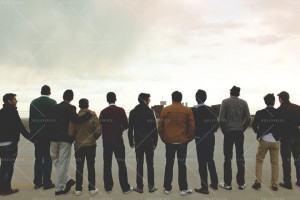 What do you love about Penn Masala?
What do you love about Penn Masala?
You know a lot of people ask me that because we put a lot time into the group and people can see that. There are a lot sacrifices you make because we travel often, we put a lot of work into practice and it is almost and even sometimes even more of a commitment to academics. I think what I love most about it is beyond the music and beyond the perks of being able to have these opportunities is the people. Right now we are 14 guys and it is just an incredible community to have. We feel like we are a brotherhood. That is just what makes it you know? That is really amazing to have.
Every trip is a lot of fun, yes, because we get to perform and usually we do relatively well, but it is more because of all the stories we share, all the experiences we have together. When we have practice, yeah we are working hard, but I think part of the reason we love going is because we love joking around with each other and telling each other stories and all that. We have tradition before every show we will get together in a huddle and do a little pump up and then after every show we sit around and talk about things that happened on stage or afterward. It is amazing. I don’t have any siblings and it definitely feels like having 13 brothers who are your best friends on campus.
 Favorite song to sing?
Favorite song to sing?
As a group one of our favorite songs to sing is our show closer it is ‘Turn Me On’ with ‘Saade Dil Te’. It is a song that is pretty old in terms of our repertoire. It is great song because it is super up beat. Both songs are up beat. ‘Saade Dil Te’ is a Punjabi song so it is very high energy. Then we have this little dance that we do with it. The parts are really fun to sing and it really energizes the crowd. That definitely would be the favorite.
A message to your fans out there and especially to the ones who loved ‘Evolution of Bollywood’?
Thank you for the love! We are incredibly grateful for all the positive feedback we have gotten. Keep listening because we have more coming up! Our most recent is ‘Without You’ mixed with ‘Teri Jhuki Nazar’ is out now and then in 2 weeks we have another song and video coming out!
You can also check out and enjoy their back catalog at https://soundcloud.com/pennmasala



